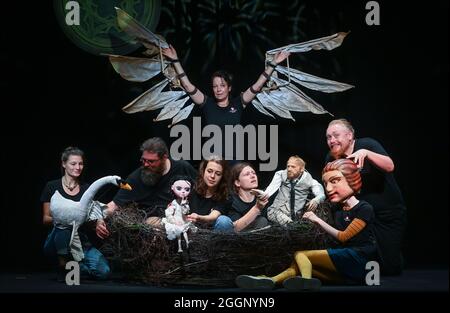
“Erotic Puppet Theater Premieres in New York City”

**Exploring Representation and Storytelling in “That Paradise Place”: A Groundbreaking Erotic Musical Delving into the Experiences of Artists with Disabilities**
Disability narratives and representation in art have often been either simplified into tragic figures of inspiration or unjustly marginalized. However, a recent production titled *That Paradise Place* has taken a revolutionary approach by centering the romantic and erotic lives of artists with disabilities in an experimental, boundary-pushing format. Created by the puppet troupe *Pussypaws Puppetry*, this erotic musical uses giant puppet alter-egos to tell the real-life stories of 12 artists with disabilities, bypassing reductive stereotypes in favor of nuanced, intimate, and colorful presentations of love, desire, and sexuality.
Presented by the Williamsburg-based organization *Summertime Gallery*, the show debuted on November 1 at the Abrons Arts Center, Lower East Side. It offered audiences a window into the lived experiences of individuals with physical, intellectual, and developmental disabilities, and the multifaceted ways in which they navigate relationships, aspirations, fantasies, and sexuality.
### The Personal Catalyst Behind the Creation
The creative initiative that gave birth to *That Paradise Place* was led by Priscilla Frank, the director, and Alana Hauser, producer, both of whom form the heart of *Pussypaws Puppetry*. The project was largely inspired by Frank’s work during the pandemic at *YAI Arts and Culture*, a nonprofit studio supporting artists with developmental and intellectual disabilities. During her time there, Frank discovered that the studio’s artists were keen to explore their own romantic and sexual desires through imaginative stories.
“They started just sharing [their] stories … their imaginary worlds or their wishes about wanting to find love,” Frank shared. “These stories were [so] much more fun to gossip about than anything from my own friendship circles.” As a result, Frank began interviewing multiple artists with disabilities about their experiences, ultimately using their stories as the foundation for the musical. Puppets provided a layer of abstraction, allowing the storytellers to express their most intimate thoughts and experiences more freely.
### A Unique Approach to Storytelling
What sets *That Paradise Place* apart is its boldness in addressing topics often considered taboo, particularly when associated with people with disabilities, such as eroticism and the complexities of desire. The artists’ experiences showcased include everything from meeting one’s first love in middle school to fantasizing about a BDSM relationship with one’s medical surgeon. By blending humor, emotional depth, and creativity through the whimsical medium of puppets, the production offers a multi-dimensional portrayal of disability within the realm of romantic and sexual expression.
The striking puppet alter-egos—designed and brought to life by Chris Chronopoulos, a cosplay artist and one of the storytellers—play a central role in the show’s creative process. By stepping into the personas of massive, fantastical creatures, the artists are empowered with a new form of self-expression that goes beyond verbal storytelling.
Each puppet allows the artist to showcase different layers of selfhood—ranging from vulnerability to their deepest sexual yearnings. For example, Chronopoulos’ song contribution, “Mystic Phoenix is Full of Love,” which reflects on his relationship with a partner he met in middle school, bridges personal history with mythic fantasy. His role as the “puppet ER doctor” during the performance further underscores his involvement in bringing these unconventional narratives to life.
### Disability and Eroticism: Challenging Stereotypes
Singer-songwriter Anna Witiuk, who has Marfan syndrome and underwent six open-heart surgeries, is one of the featured performers whose story is shared through the production. One of Witiuk’s surgeries permanently paralyzed one of her vocal cords, altering her singing abilities. Yet, rather than seeing this purely as a loss, the show captures how Witiuk has adapted and found new forms of self-expression alongside her disability. “As artists with disabilities, we often live between the stereotypes: either being an utter inspiration … or treated like untouchables,” Witiuk commented. The show allows artists like Witiuk to break free from these constraining perceptions, highlighting their experiences in all their complexity.
By weaving together humor, raw emotion, and sexual fantasy, *That Paradise Place* challenges the historically limited depictions of people with disabilities, both in mainstream media and in art. The stories presented delve into ideas of physicality and sexuality that are often overlooked, revealing the rich, diverse inner worlds of the storytellers.
### The Songs
The heart of *That Paradise Place* lies in its original musical compositions, which explore experiences both tender and hilarious. The titles alone – “Demon Daddies Full of Love,” “Busty Goddesses Full of Love,” and “Ice Elf Is Full of Love” – give an enticing glimpse into the playful yet profound nature of the songs that accompany the stories.
These songs unravel a kaleidoscopic exploration of fantasy worlds where cartoonish sexual avatars provide both